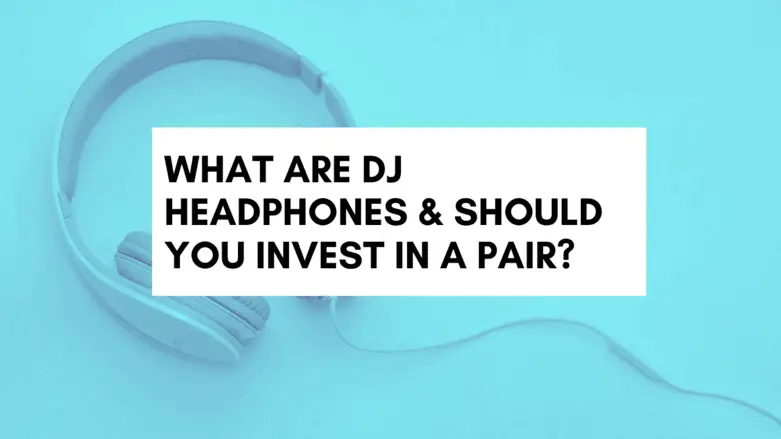
You might be still DJing with a set of headphones that are not “DJ” specific headphones and experienced a pair of non-DJ specific headphones braking. Let me tell you, you’re not the first person to admit it. I’ve gone through the same process myself and there are some key differences between normal headphones and DJ headphones to consider if you’re looking to upgrade.
What are DJ headphones?
DJ headphones are flexible and durable headphones that can be twisted easily to fit onto one ear or two at a time. The ear pieces can swivel to allow to fit a DJ better and are more practical when DJing. The audio quality, frequency and loudness of DJ headphones are setup to work best with DJ mixers and controllers.
Let’s look into more detail about DJ headphones and what you can expect to be buying when shopping around.
DJ Headphones vs “Normal” Headphones
The main areas in which DJ headphones are different to “normal” headphones include:
- Loudness
- Frequency range
- Robust & durable
- Design & functionality
- Comfortable fit
- Flexible material
- Closed ear headphones
I will go into more detail on each of these points and elaborate to give you a better understanding.
Just to caveat, my experience of the difference between headphones is that I have a pair of studio headphones for music production which enable me to mix down music projects with EQ correctly, then eventually master audio projects too. When DJing I required more durability so they don’t break and also loudness to hear the beats coming from the monitors.
Loudness
As I mentioned above about my studio headphones, which are Behringer DT 150’s by the way. I have been DJing with them using the Pioneer DDJ-400 DJ controller and I noticed that the loudness was pretty weak.
At the time I bought the DDJ-400 controller this was a negative point I heard about this particular controller, however I bought it anyway.
Sure enough, the headphone loudness wasn’t that great with using the Berhinger DT 150 headphones.
Recently I’ve had a revelation by getting hold of a pair of Pioneer DJ HDJ-X5-K headphones. Straight away the loudness is giving me more to work with, not that I want to go deaf or anything, it just gives me that option if I occasionally need to crank up the volume.
Frequency Range
DJ headphones are created with the use of DJ equipment in mind. By this I mean compatible with DJ mixers, DJ controllers and using laptops with DJ software.
The frequency range can be very different for a lot of headphones. For example, studio headphones can be more equal and level in frequencies, therefore not favoring a particular frequency range (Highs, lows or mids).
The Pioneer DJ HDJ-X5-K headphones that I’ve been using recently certainly favor the lower end of the frequency spectrum. Kick drum frequencies around the 100Hz range are more punchy and defined, with the low end sub sounds being more prominent without sounding too muddy.
Point is that electronic music is quite dominant in sub and low end kick drum frequencies and sounds. So this plays a massive part in helping DJings hear the correct sounds allowing the beat match music tracks together.
Robust & Durable
My own personal experience of purchasing DJ headphones and research online is most certainly aligned towards how durable they are.
It makes sense to have a durable and robust design made from materials that are flexible and can withstand impact.
Let’s face it, if you’re a DJ like me, you love bopping along to the beat, moving your headphones to one side and taking your headphones on and off a lot during a DJ set.
So using DJ headphones I’ve noticed that they can bend more and therefore have more buffer to be physically flexed more. Whether they are being worn or being transported to another gig.
TIP: Check that this is key feature of the DJ headphones. Not all DJ headphones are that durable and the £100 Sennheiser HD 25 headphones I bought (apparently industry standard) fell apart after 6 months of use).
Design & functionality
Swivel and rotating ear cups are amazing when it comes to DJ headphones. Granted there are some non-DJ headphones out there on the market that allow this feature too, but aren’t built as well in my opinion and a susceptible to breaking.
The great thing that I love about the Pioneer DJ HDJ-X5-K headphones that I use at the moment allow for the ear cups to fold inwards which allows for better travelling. Which is another design feature that reduces the chances of them breaking when travelling and putting them in your bag.
There are actually travel pouches that are designed to fit these kinds of DJ headphones in mind.
The cable that connects to headphones and DJ equipment for most DJ headphones is shorter but with a coiled cable. This gives the DJ the opportunity to stretch the cable if required but equally is not tripping over a mega long cable while DJing at the turntables.
Comfortable fit
I find that DJ headphones are slightly tighter fitting that regular headphones and do not seem to slip off my head when DJing.
Using my studio headphones I found this was a constant issue when DJing, which has actually led to my studio headphones to ripping slightly where the padding is.
DJ headphones are less likely to slip off your head when DJing, which is awesome if you love head banging to the beat.
Flexible material
To back up the durable point, DJ headphones do seem to be more flexible when being used. By flexible I mean its very comfortable and easy to move one ear cup to the side to allow for listening to the DJ booth monitors.
With non-DJ focused headphones I’ve found that the material is less flexible making them more open to breaking and pressing into your head making marks.
For example, studio headphones aren’t made for users that are going to use one ear cup, only the two ear cups for a long period time, say for recording music or mixing down tracks.
Closed ear headphones
The benefit that I find with DJ headphones is that the ear cups are closed ear. Meaning that closed ear headphones help to reduce audio from escaping and maintaining the sound levels being directed towards the ear.
This allows all of the sound to stay at a decent audio quality and frequency range. This means that DJs can hear the important low and mid frequencies to beat match with. The technical design behind this is that DJ headphones have decent insulation featured behind the ear cup.
High-Impedance Plays an Important Role
The impedance of DJ headphones is generally matched quite well for use with DJ equipment. So when you find yourself leaning towards a cheap pair of Sony MDR-ZX310 headphones for example, consider your purchase.
The Pioneer DJ HDJ-X5-K headphones are the same brand as my Pioneer DJ controller, so I guessed that they might work well together. It turns out that they did because they have decent impedance level of 32 Ohms. Compared to the Sony’s I’ve highlighted above, they are 24 Ohms.
Ultimately the Ohms impedance level means the sound quality and power will be impacted when you use them on DJ gear, clearly around 32 to 50 works well with DJ gear. Hence why I go for a DJ equipment brand or DJ focused pair of headphones.
Just to note that when I used the Pioneer DJ HDJ-X5-K headphones on my laptop the sound is not as great when I use them on the DJ controller. This is another reason to back up getting a pair of “DJ Headphones”.
Frequency Response & Range Influences Sound Quality
Easy to understand and an important factor that DJ headphones offer. The better the frequency range the better the range of frequencies and sound qulity.
As mentioned above the pair of Sony headphones have a frequency range of 10–24,000Hz, where as the Pioneer DJ HDJ-X5-K headphones have a wider range of 5 – 30,000Hz.
So you can see the DJ headphones have a wider range and therefore provide a better range of frequencies to hear when DJing.
Price Doesn’t Always Reflect Quality
I’ve found that in the past that even though some people rave about a certain brand or model it doesn’t mean those particular headphones will be great.
The Sennheiser HD25 headphones in particular cost around £110 ($140), I must admit the audio quality is not the issue. The build quality I feel is not up to standard because the ear cups eventually broke off.
So when checking out DJ headphones make sure to check the reviews particularly for comments on the build quality and durability.
DJ Headphones that Professional DJs Use
It seems that certain DJs favour particular brands and maybe they’ve even endorsed them. The nearest to that is V-Moda headphones releasing an Deadmau5 edition.
DJ Headphones that the pro DJs use include:
- V-Moda Crossfade
- Pioneer Pro DJ HDJ-2000 MK2
- Audio Technica
- Technics
Invest in a Pair of DJ Headphones
Here are my top reasons for investing in a pair of headphones tailored for DJing.
- Invest in DJ specific headphones if you want to the work well with DJ equipment.
- Long lasting durability and flexibility is an aspect that should be a major part of your decision.
- Comfort should be another top aspect to buying DJ headphones, not all are, but some are snug to your head and don’t hurt your head either.
- Having the ear cups enclosed to your ears versus just sitting on your ears are better. Helps to alleviate any external sound getting in the way of beat matching.
Related Questions
Can you use any headphones to DJ?
It is possible to use regular headphones to DJ with, however the audio quality and frequency might lack low end frequencies. Also the loudness can be low in comparison to DJ headphones. Durability also plays a factor in DJs choosing headphones.
Do DJs use noise Cancelling headphones?
Certain DJs may use noise cancelling headphones. In the event that a DJ is playing for extended periods of time e.g. 4 to 6 hours, then noise cancelling headphones can help protect their ears.
